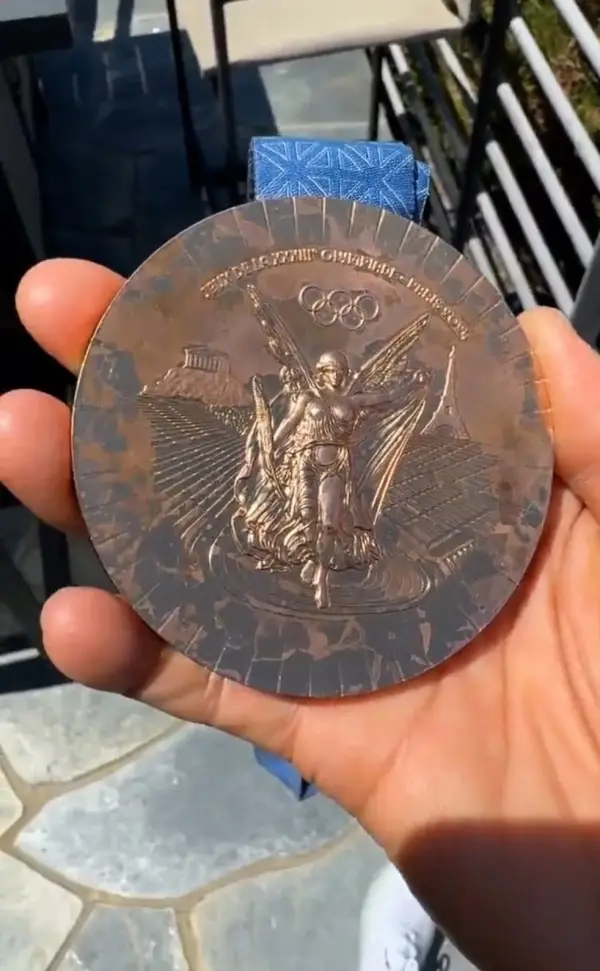Medals from the Paris 2024 Olympics are deteriorating rapidly!
Olympic scandal! Paris 2024 medals are wearing out. Over 100 complaints and dismissals. Are the medals made of chewing gum?...
Table of Contents
- Olympic Medals: Is a Gold Medal Peeling Off?
- The Dance of the Executives
- Outraged Athletes: Where is my Medal?
- The Solution on the Horizon
Follow Patricia Alegsa on Pinterest!
Olympic Medals: Is a Gold Medal Peeling Off?
Oh, Paris! The city of love, baguettes, and now... defective medals? Yes, that's right. The medals for the Paris 2024 Olympic Games have become the epicenter of a controversy that spins more than a figure skater.
Apparently, the shine of these awards hasn't lasted long, and over 100 athletes have returned their trophies to the Monnaie de Paris. Why? Because the medals have exhibited behavior more erratic than a cat chasing its own tail.
But, what is really happening? Problems with Olympic medals are not a fresh novelty. The Monnaie de Paris, responsible for producing these sporting jewels, has been dealing with issues of defective varnishes for over a year.
But, what is really happening? Problems with Olympic medals are not a fresh novelty. The Monnaie de Paris, responsible for producing these sporting jewels, has been dealing with issues of defective varnishes for over a year.
A year! Imagine having a problem with a varnish and leaving it unresolved for that long. This isn't a suspense movie, but it certainly has all the elements of a great Olympic drama.
The scandal has claimed as many victims as an episode of "Game of Thrones." Three high-ranking executives have been dismissed, likely after receiving more criticism than a referee in a football match. And it's no wonder.
The Dance of the Executives
The scandal has claimed as many victims as an episode of "Game of Thrones." Three high-ranking executives have been dismissed, likely after receiving more criticism than a referee in a football match. And it's no wonder.
The quality of the medals is directly related to a strategic decision made in 2019 that shifted production to a more industrial structure. This sounds like an attempt to turn a gourmet restaurant into a fast food chain. Result: medals with the same appeal as a bowl of cold soup.
One of the main causes of this fiasco is a regulatory ban on chromium trioxide, an essential component of the varnish. The lack of time to conduct proper testing left the medals vulnerable, as if they had been cast under an invisibility spell on their quality. Bam! Cracks, discoloration, and a myriad of returns.
Athletes are not happy, and rightly so. Let's remember American skater Nyjah Huston, who encountered a medal that was peeling after a fun weekend. "Olympic medals, improve your quality!" he exclaimed, probably while looking for a good place to hang his half-disintegrated trophy.
And he was not the only one. Other athletes, like swimmer Maxime Grousset and soccer player Lynn Williams, also raised their voices. Williams even suggested that the medals should withstand more than a simple blow, as if they were going to face the forces of gravity with the same bravery as a superhero.
Amid the storm of criticism, the Paris 2024 Organizing Committee promised to replace the defective medals. They say they will be restored as if they were new, although one wonders if they have a wizard hidden in the Monnaie de Paris. The medals, which weigh more than a good steak, must shine again like the gold, silver, and bronze they represent.
Ultimately, Olympic medals should be a symbol of eternal achievement, not a deteriorated museum piece. Paris has the challenge of restoring their shine, and in the meantime, it leaves us with a lesson: even icons of sporting excellence can have their imperfections. And you, what do you think? Would you trust a medal that leaves you with more dust than shine?
One of the main causes of this fiasco is a regulatory ban on chromium trioxide, an essential component of the varnish. The lack of time to conduct proper testing left the medals vulnerable, as if they had been cast under an invisibility spell on their quality. Bam! Cracks, discoloration, and a myriad of returns.
Outraged Athletes: Where is my Medal?
Athletes are not happy, and rightly so. Let's remember American skater Nyjah Huston, who encountered a medal that was peeling after a fun weekend. "Olympic medals, improve your quality!" he exclaimed, probably while looking for a good place to hang his half-disintegrated trophy.
And he was not the only one. Other athletes, like swimmer Maxime Grousset and soccer player Lynn Williams, also raised their voices. Williams even suggested that the medals should withstand more than a simple blow, as if they were going to face the forces of gravity with the same bravery as a superhero.
The Solution on the Horizon
Amid the storm of criticism, the Paris 2024 Organizing Committee promised to replace the defective medals. They say they will be restored as if they were new, although one wonders if they have a wizard hidden in the Monnaie de Paris. The medals, which weigh more than a good steak, must shine again like the gold, silver, and bronze they represent.
Ultimately, Olympic medals should be a symbol of eternal achievement, not a deteriorated museum piece. Paris has the challenge of restoring their shine, and in the meantime, it leaves us with a lesson: even icons of sporting excellence can have their imperfections. And you, what do you think? Would you trust a medal that leaves you with more dust than shine?
Subscribe to the free weekly horoscope
Aquarius Aries Cancer Capricorn Gemini Leo Libra Pisces Sagittarius Scorpio Taurus Virgo
-
 How to Rest Our Brain from Social Media
How to Rest Our Brain from Social Media
Give Your Brain a Break: Disconnect from Social Media and Combat Neurochemical Imbalance for Lasting Well-being Without Relying on Technology. -
 Eliminate cholesterol with this hot infusion, according to science
Eliminate cholesterol with this hot infusion, according to science
Scientific studies have shown that green tea can reduce LDL cholesterol. -
 Yuval Noah Harari discusses AI and its dangers in his new book
Yuval Noah Harari discusses AI and its dangers in his new book
Yuval Noah Harari in his new book 'Nexus' warns about AI: more powerful than Hitler and Stalin, threatening privacy and our social structures. Read more! -
 Watch out for the mercury in the fish you eat! How to avoid it, which species to eat
Watch out for the mercury in the fish you eat! How to avoid it, which species to eat
All fish contain mercury, but only four should be avoided. Learn which ones they are and how to choose safe fish without complicating things. -
 Alarm: Cancer in Young Adults and Women Dramatically Increases
Alarm: Cancer in Young Adults and Women Dramatically Increases
Attention! Cancer is no longer just an issue for older people: it is growing among young people and women. Incredible but true! The reality is changing.
I am Patricia Alegsa
I have been writing horoscope and self-help articles professionally for over 20 years.
Subscribe to the free weekly horoscope
Receive weekly in your email the horoscope and our new articles on love, family, work, dreams and more news. We do NOT send spam.
Astral and numerological analysis
-
 Discover your future, secret personality traits and how to improve in love, business and life in general
Discover your future, secret personality traits and how to improve in love, business and life in general
-
 Online Dream Interpreter: with artificial intelligence
Do you want to know what a dream you had means? Discover the power of understanding your dreams with our advanced online dream interpreter using artificial intelligence that responds to you in seconds.
Online Dream Interpreter: with artificial intelligence
Do you want to know what a dream you had means? Discover the power of understanding your dreams with our advanced online dream interpreter using artificial intelligence that responds to you in seconds.
-
 Why do we enjoy watching horror movies? Science explains it
Why do we enjoy watching horror movies? Science explains it
Discover why we love terror on Halloween: Science reveals how fear and stress hormones can be pleasurable for our brain. -
 Birth Crisis: Are We Heading Towards a Childless World?
Birth Crisis: Are We Heading Towards a Childless World?
Are we heading towards a childless world? Plummeting birth rates, aging population. Can we reverse it? Infobae consults experts to explore the consequences. -
 COVID vaccines protect the heart, according to recent studies
COVID vaccines protect the heart, according to recent studies
A study from three British universities reveals the effects of the Pfizer/BioNTech and AstraZeneca vaccines in adults. Discover the results! -
 New Molecules for Antibiotics Discovered in the Gut Microbiome
New Molecules for Antibiotics Discovered in the Gut Microbiome
Discover how the gut microbiome may be key in the search for new antibiotics. Researchers from the University of Pennsylvania reveal this in Cell. -
 Can Your Joints Predict Rain? Science Weighs In
Can Your Joints Predict Rain? Science Weighs In
Joint pain as a storm detector? Joints can foresee rain. Science or myth? Pressure and exercise might hold the answer. ?️? -
 Miracle plant to combat flies: frees windows from insects
Miracle plant to combat flies: frees windows from insects
Discover the plant that repels flies and beautifies your home. Aromatic for you, but their terror. The natural and decorative option you need! -
 The formula for happiness: Money income is not the main variable
The formula for happiness: Money income is not the main variable
Revolution in happiness! A major global study analyzes 200,000 people in 22 countries and redefines well-being beyond GDP. ?✨ -
 The fascinating hidden meaning of your life according to your Zodiac sign
The fascinating hidden meaning of your life according to your Zodiac sign
Discover how your horoscope can guide you to a more fulfilling life. Personalized reflections for each astrological sign. -
 Traces of Jesus' Path Discovered in Jerusalem: Astonishing Find
Traces of Jesus' Path Discovered in Jerusalem: Astonishing Find
Archaeologists discover traces of Jesus' path in Har Hotzvim, finding stones and paving tools from biblical times. -
 What does it mean to dream of a train ride?
What does it mean to dream of a train ride?
Discover the meaning behind your dreams with this article on What does it mean to dream of a train ride? Learn how to interpret your dreams and discover their hidden message. -
 What does it mean to dream of firemen?
What does it mean to dream of firemen?
Discover the hidden meaning behind firefighter dreams in this article. Are you experiencing an emergency situation in your life? Read more! -
 Two moments in life are crucial for aging: 40 years and 60 years
Two moments in life are crucial for aging: 40 years and 60 years
Discover how aging affects your metabolism and physical and mental health. Research with Stanford on crucial changes and the importance of diet and lifestyle. -
 Discover how your ego according to your zodiac sign affects you
Discover how your ego according to your zodiac sign affects you
Discover how zodiac signs can face ego challenges and learn how to overcome them to thrive and survive.